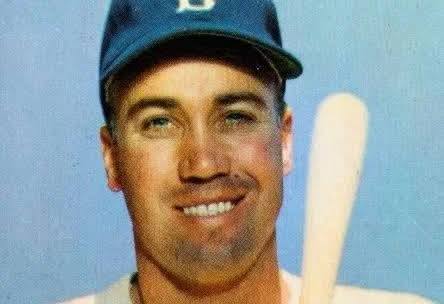Duke Snider was much more than just a baseball player; he was a symbol of hope, resilience, and pure passion during one of the most thrilling eras in the sport’s history. To innumerable fans, he was a hero whose every swing of the bat carried the weight of dreams and aspirations, an embodiment of the fervent spirit that made baseball America’s beloved pastime. His contributions transcended statistics, transforming him into a living legend whose influence would ripple through generations.
Born Edwin Donald Snider, Duke earned his iconic nickname early in life—a moniker that soon became synonymous with greatness. From his earliest days on the diamond, it was clear he was destined for more than just a career in baseball. With a fluid swing, natural power, and an uncanny ability to read pitchers, Duke captivated audiences with his extraordinary talent. But it wasn’t just his physical skills that made him stand out; it was the way he played the game with heart, intensity, and a deep understanding of what baseball meant to his fans.
By the time the 1950s rolled around, Duke Snider had firmly established himself as one of the premier players in Major League Baseball. As a center fielder for the Brooklyn Dodgers, he dazzled crowds at Ebbets Field and beyond. His keen eyes and lightning-fast reflexes made him a defensive marvel, and his offensive prowess was undeniable. Snider’s towering home runs were not just runs on the scoreboard—they were moments of collective joy that sent waves of exhilaration through packed stadiums and living rooms alike.
The Dodgers, often referred to as “Dem Bums” by their ardent followers, carried the hopes of Brooklyn and its working-class population. To the fans, the Dodgers were more than a team—they were a symbol of the city’s grit and determination. Duke Snider was their shining star, the man who could turn the tide with a single swing of his bat.
Among the countless memorable moments in Snider’s illustrious career, none shone brighter than the 1955 World Series. For years, the Dodgers had come heartbreakingly close to winning it all, only to fall short in crucial moments. Their rivalry with the New York Yankees was fierce and storied, with Brooklyn often playing the role of the underdog. But 1955 promised something different—it was the year everything could change.
As the series unfolded, the atmosphere was electric. Fans around the nation, especially in Brooklyn, were glued to their radios and televisions, their hearts pounding in sync with every pitch and swing. Each game was a battle not only on the field but also within the soul of a city yearning for glory. The pressure was immense; the weight of history bore down on the players, and the collective hopes of a generation rested on their shoulders.
When the series reached its climactic seventh game, tension soared to unimaginable heights. It was a battle of nerves, skill, and sheer willpower. The stakes could not have been higher, and every moment felt suspended in time. Fans held their breath, caught in the electric grip of the moment, knowing that the outcome of this game would be etched forever in baseball lore.
In the heat of that decisive game, the Dodgers found themselves in a pivotal situation. The scoreboard was tight, and the outcome hung precariously in the balance. It was in this crucible of pressure that Duke Snider rose to the occasion, embodying the very essence of what it meant to be a champion.
Without hesitation, with the weight of an entire city’s dreams resting on his shoulders, Snider stepped up to the plate. The pitcher wound up, the ball hurtled toward him, and with a crack that echoed through the stadium and the hearts of millions, Snider connected. The ball soared into the sky, a majestic arc that seemed to suspend time itself.
That hit wasn’t just a home run—it was a defining moment, a crystallization of years of hard work, sacrifice, and unyielding dedication. As the ball cleared the fence, the crowd erupted in joyous celebration. Brooklyn was on the cusp of a historic victory. Snider’s hit was more than a statistical achievement; it was the ignition of a flame that would burn forever in the hearts of Dodgers fans.
When the final out was recorded, and the Dodgers clinched their first-ever World Series championship, the eruption of jubilation was unprecedented. The championship trophy was hoisted high, but even more powerful was the fire ignited within every fan’s heart. Duke Snider, standing on the field in that triumphant moment, was the living embodiment of a dream fulfilled—a dream not only of victory but of resilience, hope, and the enduring spirit of the game.
But the story does not end with that historic win. Duke Snider’s impact stretched far beyond the confines of the baseball diamond. He kindled an unwavering faith in the power of perseverance and passion, reminding fans that heroes are made not just by their achievements but by their ability to inspire others. His legacy is woven into the fabric of baseball history, a testament to the magic that happens when talent meets heart.
Long after the cheers faded and the stadium lights dimmed, the flame Snider lit continued to glow. For countless fans, his home runs became cherished memories, stories to be passed down from parent to child, tales of a golden era when a man with a bat could unite a community and lift spirits during challenging times. His name is forever etched alongside baseball’s greatest, a beacon of what it means to be a hero both on and off the field.
Duke Snider’s greatness was not just measured in home runs or batting averages—it was in the way he connected with people, the joy he brought, and the dreams he helped realize. He reminded us all that heroes come in many forms and that sometimes, a swing of the bat can do more than score runs; it can inspire generations.
If you want, I can also expand on specific parts like his early life, other career highlights, or the cultural significance of the Dodgers in the 1950s! Would you like me to?


